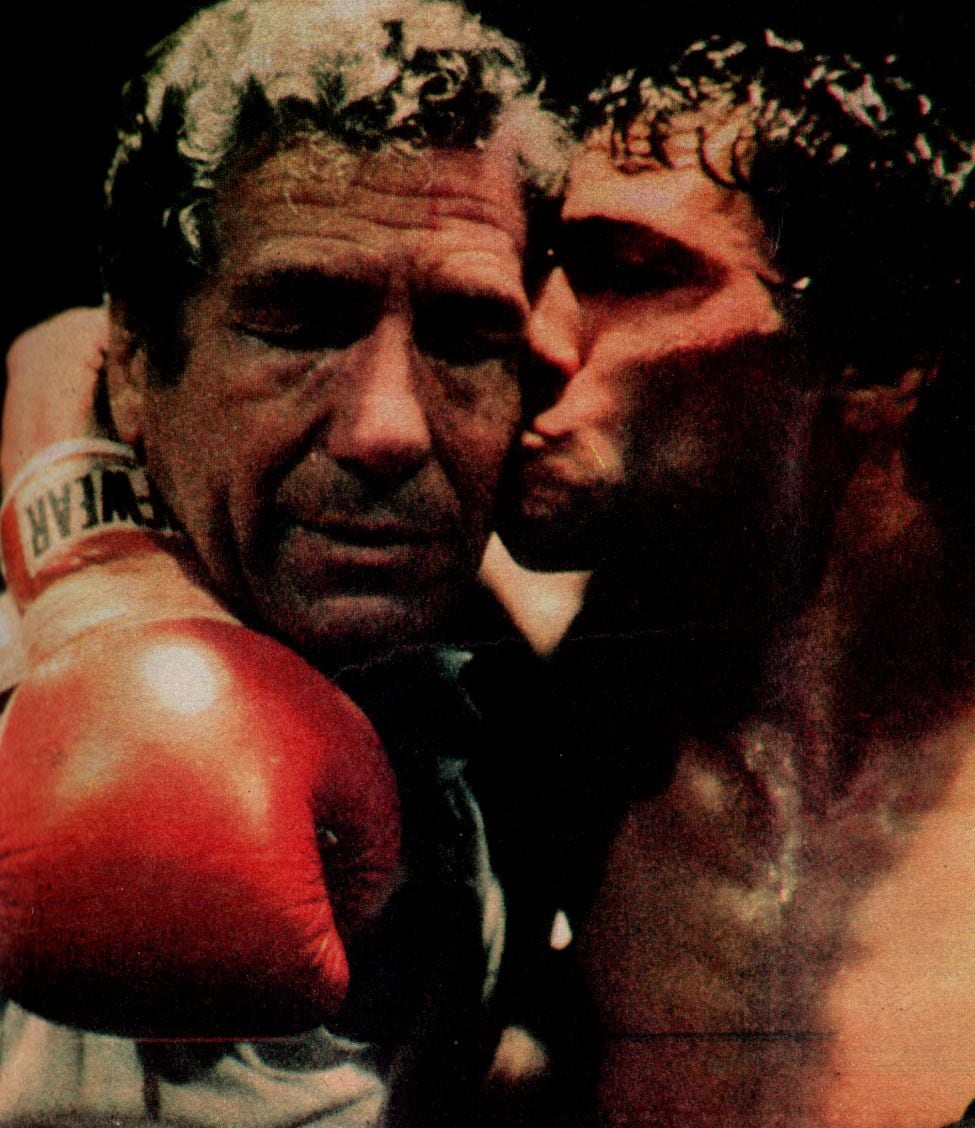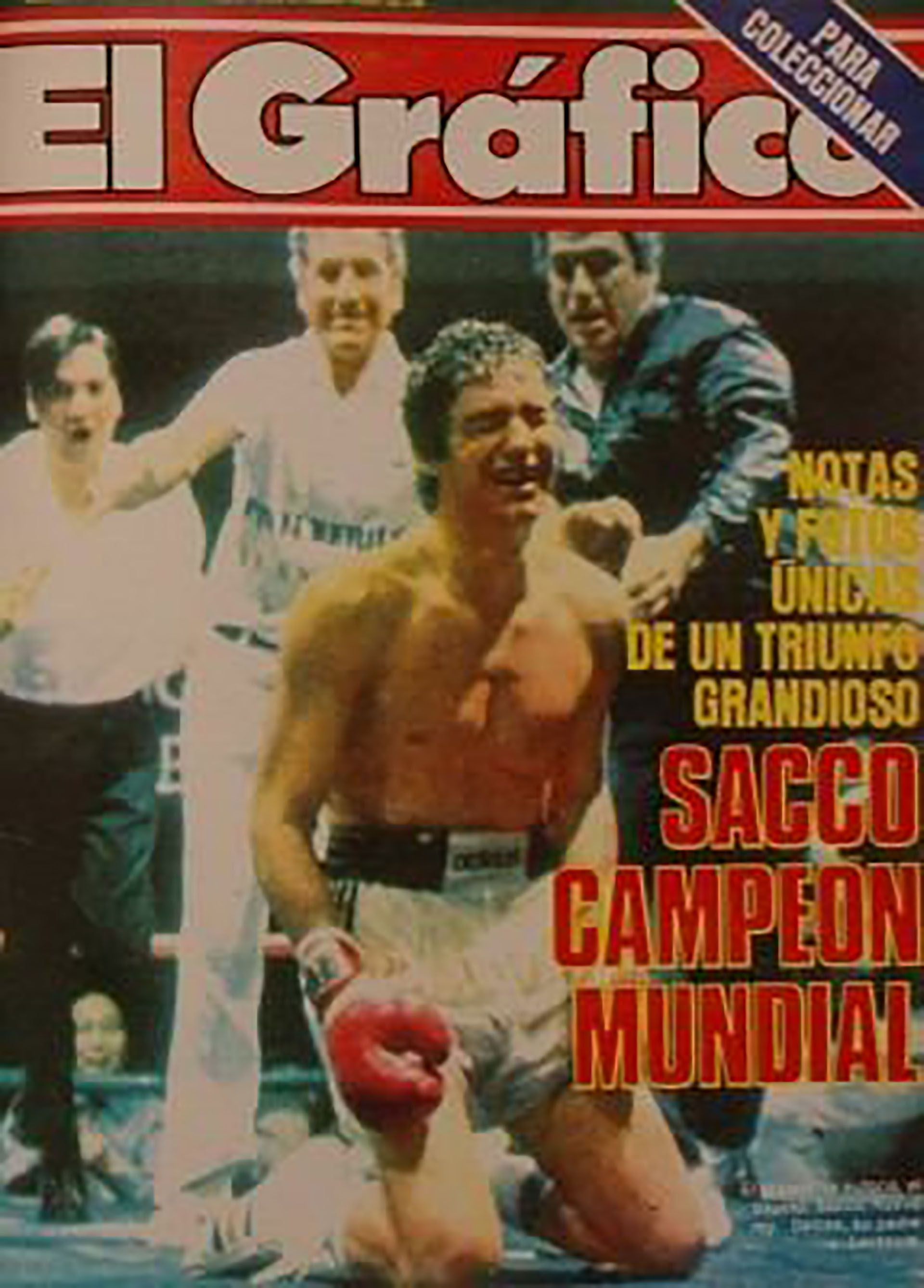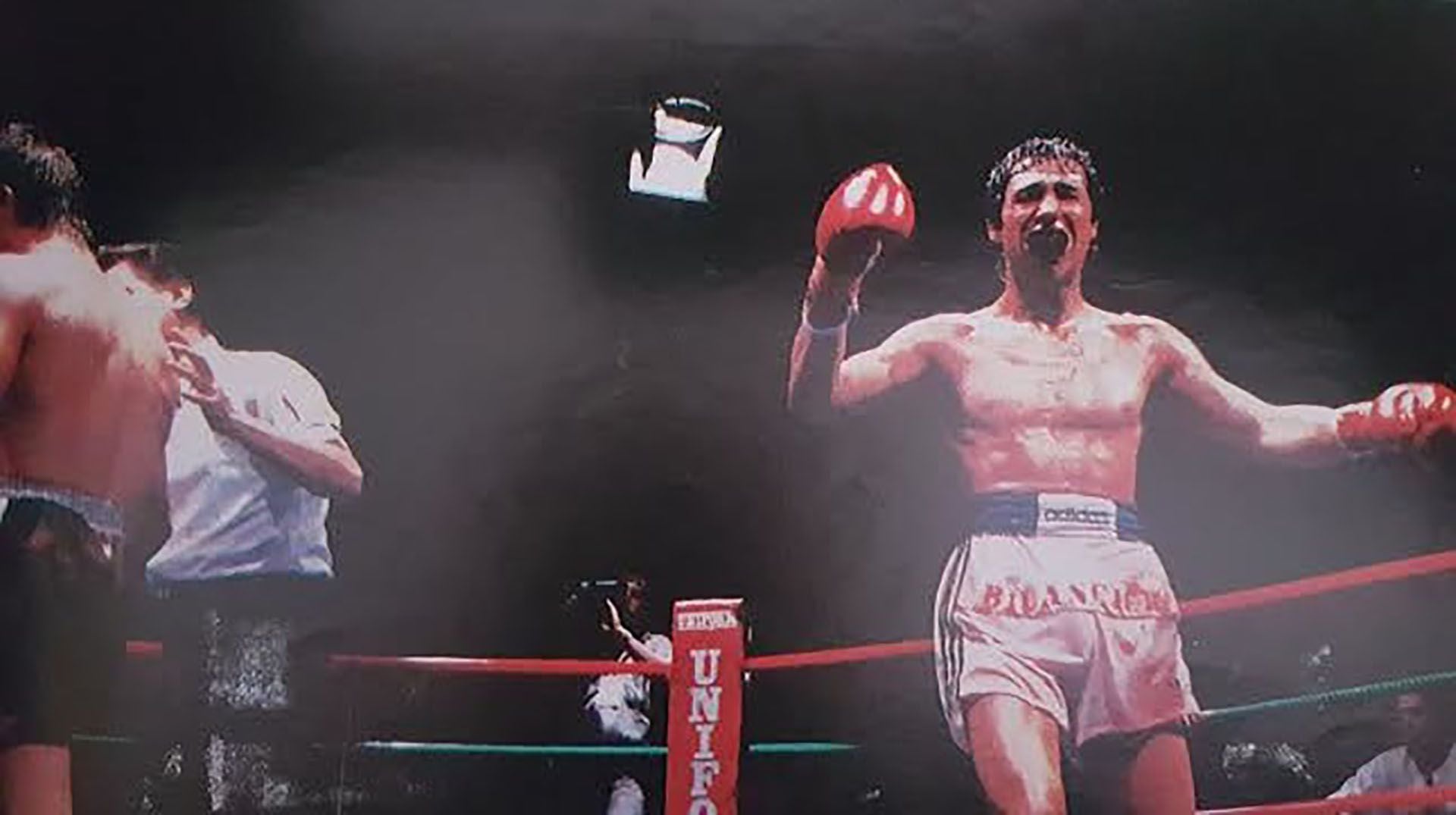:quality(85)/cloudfront-us-east-1.images.arcpublishing.com/infobae/PNVK535P5ZGILJM33PTO3OG4WE.jpg 420w)
He looked like a placid archangel who dominated the ring from a heavenly space.
How beautiful it was to see Uby Sacco, a talented boxer who knew everything and therefore could offer the alternate doses of class to box and rigor to fight. He was a crack destined for a world star.
Sugar Ray Leonard, commentator on his fight against Gene Hatcher for CBS, publicly defined it this way: “Sacco is a boxer of the old ones, of those who no longer exist, of those who made boxing an incomparable art.”
That night of Sunday, July 21, 1985 at the Casino in the Municipality of Campione D'Italia (Switzerland), Ubaldo Néstor Sacco won the junior welterweight world crown (WBA) by beating Texan Gene Hatcher by technical knockout in the 9th round (1′ 28"). This victory claimed his superiority to the American against whom an obscene and local verdict had robbed him of victory in the first fight held in Fort Worth, Texas, on December 15, 1984, by losing that tremendous battle in split ruling after 15 dramatic rounds. So much injustice marked the life of Uby who believed that it would no longer be worth boxing, for what? and that the revenge was a pious lie with which Tito Lectoure — the businessman — calmed the anxiety of his father — Don Ubaldo Francisco — who never stopped demanding it. And yet one blessed day in May 85′, the revenge was confirmed. But it was too late...
It was unforgettable that night in that beautiful Swiss villa in front of Lake Lugano that Mussolini bought in 1933 for an Italian municipality where its citizens could play since the casino was banned in the Italian territory.

That's when I wrote in my note for El Gráfico 36 years ago entitled “He boxed like a teacher, handsome like a giant” (Edition 3433 of 23-7-85): “My pants are stained with blood and my body soaked with sweat. I feel that my heart is pounding fast and I declare myself unable to be clear to tell everything. They come to my visual record images that will stay forever. I see Uby kneeling after the referee (Ernesto Magaña, Mexican) declared him the winner. I remember old Ubaldo his father running after him to embrace him and around them thirty Argentines arrived from all over to explode in jubilation. I talk and listen. I don't know what I'm saying, or what they tell me, but it's there, on the ring, five minutes after becoming champion claiming the belt that Hatcher's own mother refuses to give up, even if it's for the photo. Yes, the belt is not returned, it is for the still defeated champion, but it is usually necessary to lend it for the photo. Nothing, not even that.”
“I walk through the narrow corridor between pleasures, applause and phrases from colleagues who in different languages announce to the world the birth of a classy champion. The most repeated adjectives are: 'bravissimo campione', 'great champion', 'a master lecture'. I get to the dressing room. A neat, small but comfortable enclosure in which Sacco, as in Fort Worth, greeted all his friends from Mar del Plata (Gordo Bilancieri, Cat Mignini, Susso Martinez, my God, will they be there? , how to find them?) with smiles, while his swollen and aching right hand sank into a bucket full of granita ice.”
After so much joy it seemed that everything was beginning and in reality everything was ending.
That day her mother Hilda, a selfless and tender woman, took a bus early in the morning to travel from her essential Mar del Plata to Retiro. She then stayed alone at the Plaza Roma Hotel in front of Luna Park and around noon she had time to eat a sandwich in a cafeteria on Lavalle Street before taking the train that would drop her off in Lujan. He wore a modest purse hanging from his arm and inside it a medal of the Virgin who he was going to ask for his son Uby. It was one of the two — today Marcelo, Uby's brother — who had blessed after his birth, the other smaller one, would be on with a hook pin on the inside of the shorts with which Uby would go up to fight in just five hours... That medal was the same one that had accompanied his father Ubaldo for a large part of his fantastic campaign of 75 fights against the best middlemen of the 50s: Lefty Lausse, Chief Selpa, Puma Rivero.. . I will never forget the night I met Doña Hilda: it was at Luna Park when her husband Don Ubaldo was fighting Aurelio Diaz that she defeated. The next day, on July 28, 1955, Uby was born, circumstantially in Buenos Aires (in Chorroarín and Triumvirato) who from his mother's womb and about to reach the world heard the sound of the bell, the clash of the gloves and the applause of the crowd. Thirty years later that baby would fight for the world crown and she was willing to stay in the Basilica praying until everything had happened. He didn't want to see anyone or know anything until 7:30pm, when he left to return to the hotel, people on the street or some radio turned on told him what his son's fate had been. Finally it was a red plaque from Chronicle that from a stained glass window whose helping hand called her to say: “Last moment: Uby Sacco new world champion, we will expand...”.

Around that time, when it was 20.57 in Switzerland, smiling, tucked into blue pants and a light blue shirt, with his hands behind him like an attentive police officer of the round. Uby arrived at the stadium, looked at everyone smugly and began to change slowly. A lucky misfortune happened to him: he wore a pair of brand new boots on the same foot, the right one. Good thing he had put another pair of used shoes in his bag and was able to combine them correctly. In fact, since the night before, eating caviar canapes, toasting with beer and dancing Ravel's bolero with whom he was then his wife (Inés Rocha) with whom he endured a traumatic and agonizing relationship, Uby had transgressed everything and the last straw was going to the pool on the day of the fight and being exposed to the sun less than six hours from the combat and with 30° of temperature. This motivated Tito Lectoure to order Don Ubaldo to take his son out of the pool, otherwise he would leave. There the father demanded that he return to his room and we lived in a very difficult moment in the friction generated between father and son. By the way Uby left the pool with unsimulated annoyance and returned to the room.
Moreover, and with regard to this atypicality in high-performance athletes, the prestigious doctor Mario Pascone, an Italian sportologist graduated from the University of Rome, a great student of sports medicine of that time, arrived in Campione at the request of Lectoure at the hand of my colleague and friend Bruno Passarelli who was covering the event with me. Bruno took the doctor from Rome to attend to Sacco in the days before and mainly to infiltrate his right hand before the fight, which he did. The deportologist Pascone often took his head when he saw how Sacco fed and drank. And it almost always ended with a phrase: “If you win, a case for the study is a miracle. To present it at an upcoming congress of sports medicine.” “If you win, it's a miracle”. It was the phrase that was left to all of us. And the miracle came in the 9th round when the wounded, bleeding and exhausted Hatcher could not continue.
Everything was ephemeral at Uby: he lost the world championship by points to Italian Patrizio Oliva at six months old, on March 15, 1986 in Monte Carlo when drugs killed the athlete by turning man into an object.
“My boundaries were completely broken the day I walked into a friend's bowling alley crying. I don't know why he was crying. Out of shame, so that no one could see me, I went to the bathroom. Unfortunately for me there was an acquaintance who was making a loop in his arm and then injecting himself. I didn't give him time, I butted the ready-made syringe and injected it. That day I ruined my boxing career that could have been much more promising. And worst of all, I ruined my life, too. Then, I went on like this for a while longer. In this way I lived purely and exclusively to get high. I had seven seizures in a row. The doctor couldn't believe that my heart could have endured such nonsense. He locked me in a room in the house of Los Troncos and until I convulsed, he wouldn't stop. Until someone saved me in the bathroom, threw my tongue back and gave me mouth to mouth breathing because I was dying. This is all incredible, but it's true. But the most unexpected thing is that after all this hell, I got the most important opportunity of my life. The chance for the world title”.
So before he knew that he would fight for the title, that the promised rematch had come to fruition, that life was giving him another chance, Uby had already given his dreams to drugs.

Sacco's manuscripts are the posthumous display of his courage. And Lorena and Sebastián will have to transform them into valuable elements for an anthology that journalist and writer Rodolfo Palacios will enrich with his talent by contributing others testimonies of people who knew the champion well. It will be an unmissable book or an extraordinary mini-series. His children have also achieved testimonial pieces such as gloves, dressing gowns, booties after an intense search. So much so that they found a glove in a dumpster and others that were offered by Mercado Libre. The Uby of the bowling clubs, of the high night, the one who fought with sailors, policemen, butts, hitmen or femicides, the one admired by Diego and Menotti; the kid who had a unique genetic for sports and always showed off playing football, basketball, handball, ping-pong, billiards, the one admired by Sugar Ray Leonard and Mano of Piedra Durán, also wrote in handwriting:
— “I have nothing, I am in a cell of the Federal Police in Mar del Plata. Fame came to me at the same time as the world boxing title. But everything didn't last me long. The drug destroyed me. For a long time I was a kite without a tail. I always liked to go along the edge of the ledge. Why? Because I liked danger. Being on the border of the abyss gave me pleasure. That's how I lost everything.”
— “My worst nightmare with cocaine was more or less in mid-1984, when I was closest to fighting for the world title. Nor do I tell you what 1985 was, the year I won the title in the rematch against Gene Hatcher, let alone 1986, the year that, despite the fact that I did not lose the title in the ring because the Italian Patrizio Oliva was never superior to win a world championship. I had already given it to him or anyone who had confronted me before I fought. Why did I come up badly trained? Why wasn't my mentality that of an athlete who has to defend and represent his homeland? Do you know why? Because I was totally trapped by drugs.”
— “I have nothing, I'm in a cell of the Federal Police, in Mar del Plata. In the world many would blame fame and money. Or the friends that money and fame give you. Others would blame success and the consequences of success. Everything is easier: women, women in quotes, give themselves to you and promise you indescribable pleasures. Others blame the drug. I say, and I assure you, that I was never mature to be with a woman like Patricia, whom I call Peco's. She was and is too much woman for a 25-year-old boy who thought he was a man who knew them all and didn't really know anything. Everything I can know now I learned by his side. Only now that life made me grow 20 years in a single minute. But it's too late, you can't remedy the hopeless. May those who failed them find the happiness that I never gave them. By putting up with me, they won paradise many years ago. Don't loosen up because I'm sure you're going to be happy. Whatever I do now I want it to be for my two children, Lorena and Sebastian, two unique beings. May God bless you both, I love you until eternity.”
This creature without hatred or bitterness, already lean, aged and unrecognizable with unbalanced gait and heavy breathing descended to the basement of its destination on May 28, 1997 at the Regional Hospital of Mar del Plata when he was 41 years old. He endured a nasal tumor, tuberculosis and some other infectious disease that promiscuous syringes usually transmit.
His encounter with Monzón in Batán prison brought tears to history as glory dies at every dawn.
And Uby knew he was mourning his own death.
KEEP READING:
